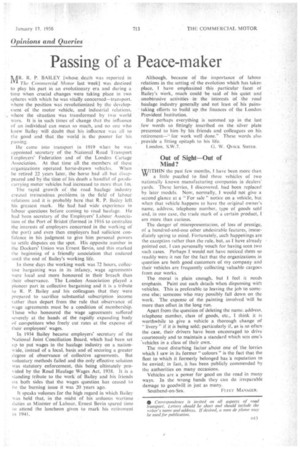Opinions and Queries
Page 59

If you've noticed an error in this article please click here to report it so we can fix it.
Passing of a Peace-maker
MR. R. P. :BAILEY. [whose, death was reported in The Commercial Motor last Week]. was destined to play his part in an evolutionary era. an.d during a time when crucial changes were taking place in two spheres with .which he was vitally concerned—transport, where the position wag revolutionized • by the development of the motor vehicle, and industrial relations, where the situation Was transformed by two world wars. It is in such times of change that the influence of an individual can mean so much, and no one who knew Bailey will doubt that his influence was all to the good arid that the world. is the Poorer for his passing.
He came into _transport in 1919 when he was appointed secretary of the National -Road Transport Employers' Federation and of the London Cartage Association. At that time all the members of these organizations operated horSc7drawn vehicles. When he retired .22 years -later, the .horse had all but disappeared•atid.by-the aerie of his death a handful of goodscarrying motor vehicles had increased tomore than 1m.
The rapid growth of the road . haulage industry created tremendous problems. in the -.field of labour relations and it is probably here that R. P. Bailey left. his greatest mark. He had. had wide experience in labour questions before coming to -road haulage. He had been -secretary of the Employers' Labour Association of the Port_of Bristol (formed in 1916 to centralize the interests of employers concerned in the working of the port) and even then employers had sufficient confidence in his judgment to give him personal powers to settle disputes' on the spot. His opposite number in the Dockers' Union was Ernest Bevin, and this marked the beginning of a friendly association that endured until the end of Bailey's working life.
In those days the working week was 72 hours, collective bargaining was in its infancy, wage agreements were local_ and more honoured in their breach than . their observance. The London Association played a pioneer part in collective bargaining and it is a tribute to R. P. Bailey and his colleagues that they were prepared to sacrifice substantial subscription income rather than depart from the rule that observance of wage agreements must be a condition of membership. Those who honoured the wage agreements suffered severely at the hands of the rapidly expanding body of competitors who freely cut rates at the expense of illeir employees' wages.
In .1934 Bailey becameemployers' secretary of the National Joint Conciliation Board, which had been set up to put wages in the haulage industry on a nationwide, instead of a local, basis and of securing a greater degree of observance of collective agreements. But voluntary methods failed and the only effective solution was statutory enforcement, this being ultimately provided by the Road Haulage Wages Act, 1938. It is a standing tribute to the work of Bailey and his friends on both sides that the wages question has ceased to he the burning issue it was 20 years ago.
It speaks volumes for the high regard in which. Bailey was held that, in the midst of his arduous wartime duties as Minister of Labour, Ernest Bevin spared time to attend the luncheon given to mark his retirement in 1941. Although, because of the importance of labour relations in the setting of the evolution which has taken place,. I have emphasized this particular 'facet of Bailey's Work, Much cotild be said of his quiet and . unobtrusive activities -in: the interests of the road haulage industry generally and not least of his pains ' taking efforts to build up. the finances of the London • Provident Institution. •
But perhaps everything is summed up in the last• • few words so fittingly inscribed on the silver plate presented to himby his friends and colleagues on his retirement—", for work well done." These words also provide a fitting epitaph to his life.
London, S.W.7. G. W. Quick SMITH.




























































































































